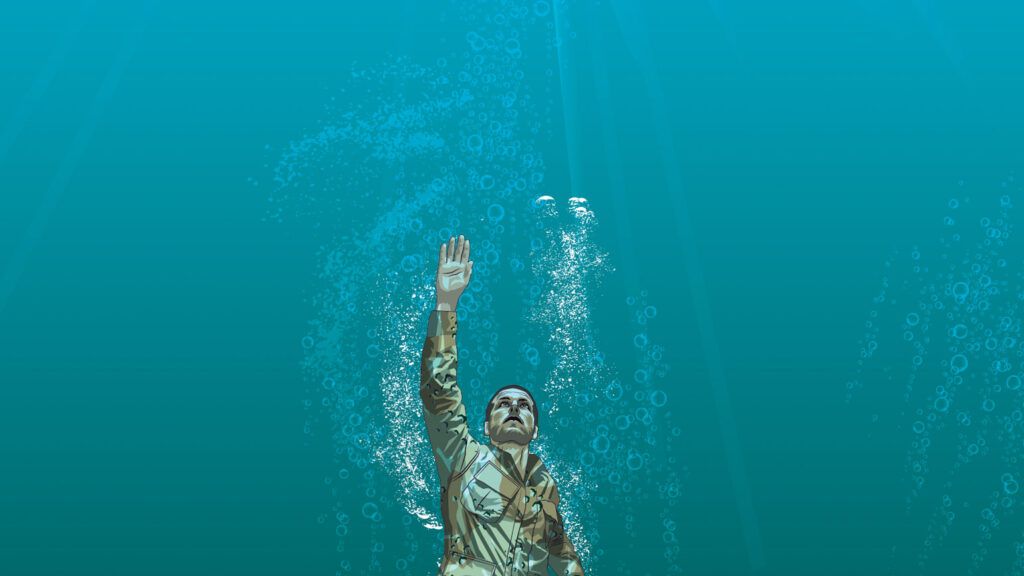Hawija, Iraq. June 2004. Clack! Clack! Clack!
Bullets whizzed by. Everyone ran for cover. The gunfire had come out of nowhere. I ducked behind a concrete wall and looked for the rest of my unit. They were more than 45 feet away, too far for me to get to. “Hold position!” my sergeant yelled over the gunfire.
We were in a bad spot. We needed backup and couldn’t move until another unit got to us. I took a deep breath and reloaded my gun.
BOOM!
The ground exploded, shrapnel blasting through the air. Pain seared through my side. I was flat on my back. Was I hit? Breathing fast, I ripped open my body armor and stuck my hand inside. When I pulled it out, it was covered in blood.
I lay there, helpless and alone, as bullets ricocheted around me. Rockets shrieked overhead. I clenched my teeth, bracing against the pain. My breaths came in ragged gasps. Suddenly, there were hands on me, dragging me. One of my fellow soldiers had managed to get to me. He pulled me to a spot with more cover and yelled for a medic.
“Everything’s going to be okay, Evans,” he said. “We’ve got you.” His words came to me through a fog.
I fought to keep my eyes open. I struggled to breathe. The medic applied pressure to my side to stop the bleeding. “You have to stay awake,” he said. Still, I felt myself drifting. “Stay with us, Evans.”
Everything went black.
I woke up in another place. It felt as if I were underwater, but I wasn’t holding my breath. Everything was cool. There was no pain. I felt weightless, drifting through this space, so different from the hot, dry Iraqi desert. Where am I? I looked up. Light rippled down, refracted beams from the surface reaching past me. Though I didn’t know what was beyond it, I was overcome with the urge to reach it. I kicked my legs and paddled with my arms. I floated up with ease, as if propelled by an unseen force.
I’m dying. I was not afraid. In fact, I felt more at peace than I ever had before. My life leading up to my military career had been hard. My parents were addicts. My father was abusive; my mother, neglectful. I’d fought against the odds to avoid ending up like them. I struggled to pass my classes in high school and to drown out the criticism from peers—that I was too dumb to make a career in the military. Right out of high school, I’d completed basic training and gotten my orders for a one-year tour in Iraq. I felt meant for the job. Combat was nothing new; I’d been fighting my whole life.
Now I felt total surrender. My struggles were over. If this was death, then I was willing to accept it. I’d signed up for the military knowing that this could be my fate. I was okay with it. Then something caught my eye.
An image appeared before me as if projected on glass. It was my mother on the day I was born. She held me close, something I never remembered her doing when I was a little kid. Still, I felt comfort in that moment. Then another image appeared. This time, it was something that didn’t happen: my mother giving me up for adoption. I saw myself being taken away from her. What is this? It took me a moment to understand. This was what could have happened. This was the avenue my life didn’t take.
I swam higher. More images appeared. I saw when my mother finally left my father and he was out of our lives for good. I saw the day she married my stepfather and started to pull our lives together. I saw the day I enlisted in the military. I saw my grandfather, a veteran, telling me he was proud of me. Important moments that made me who I am.
With each image, I went back to the emotional place I’d been in as I lived them. Pain. Relief. Fear. Expectation. And with each scene came a counterscene, images of what could’ve happened if different choices had been made. If my mother had never left my father and he remained a toxic presence my life. If I hadn’t joined the military. I shuddered when I saw I could have ended up either dead or in jail if I hadn’t enlisted. I knew that I was meant to understand that my life had direction and that each step along the way had been shaped by the choices made.
Now I was close to the surface. I heard something.
“I love you, Babe.”
“We love you, Daddy.”
I stopped swimming. I couldn’t see anything. No images anymore, just voices. Somehow I understood that these were the voices of my wife and children. But how was that possible? I was 19, far from fatherhood. I didn’t even have a girlfriend. Yet I was absolutely certain. My wife’s voice was filled with warmth and patience. The voices of my children—a girl and a boy—were sweet and trusting. I felt wrapped in the most incredible love. It was intense, as if all the love I’d feel for my future family was concentrated into this one moment. This role—of being someone’s husband, someone’s father—just felt right.
In that moment, something changed. I was no longer complacent about dying. I wanted to experience this love. I wanted to see my wife’s face and hug my kids. I made the choice: I was going to live.
At that instant, I became acutely aware of crushing pressure. My body ached. My lungs burned for air. I started fighting to get to the surface, to breathe. It was the way back to life. I kicked my legs as hard as I could. My arms raked at the water in desperation. I wanted to stop, to rest, but I knew I couldn’t. Keep going, I thought. For them.
My hand broke through the surface, but I couldn’t push myself any higher. I sank down, past all the images I had passed on the way up. The surface faded away. I was sinking into darkness. Then the water whooshed downward in a whirlpool, as if someone had pulled a plug. It swirled around me and out an unseen drain.
“EVANS, YOU HAVE TO WAKE UP!”
I sucked in a huge gasp of hot desert air.
“Stay with us!” Hands slapped my face. My eyes shot open. The medic and the other soldier were leaning over me. I was still on the ground where I had lost consciousness. The medic had just drained the blood from my lungs. I could breathe again. I was alive—for now. I could hear a helicopter overhead. I was getting out of there. I grabbed hold of the medic’s shoulder and clung for dear life as I began my transport to the nearest medical base.
The road to recovery was long and difficult. I was stuck in bed for months. The doctors warned me I might be medically discharged. The idea of a future family, the reason why I’d wanted to live, felt unattainable without a career. I wondered if what I experienced was real or just some product of my oxygen-deprived brain. I fell into a deep depression.
Then my mom and stepdad introduced me to their friend’s daughter, Jen. She had offered to chat with me after hearing that I was going through a hard time, and my mom thought speaking with someone my own age might help cheer me up.
What began as a once-a-week phone call with Jen turned into talking every day. She was an incredible woman. She was so full of patience and hope and faith. She told me about her life, how she was in school to become a teacher. Over time, I opened up to her too. With Jen’s encouragement, I made a full recovery. But I decided not to reenlist in the military. I knew the path my life needed to take, and I knew with absolute certainty who would share that path with me.
Jen and I just celebrated our thirteenth wedding anniversary. We have two children—a girl and a boy. And when they say, “We love you, Daddy,” their voices are more familiar to me than anyone will ever know.




